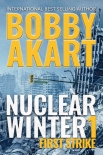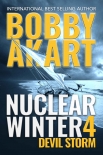Nuclear Winter First Strike Bobby Akart (children's ebooks free online .txt) 📖

- Author: Bobby Akart
Book online «Nuclear Winter First Strike Bobby Akart (children's ebooks free online .txt) 📖». Author Bobby Akart
“If the nuclear blast produces a large enough EMP to impact an entire region, like the West Coast, then the other power grids will work overtime to supplement the needs of areas outside the impact area. This may result in a cascading failure of the entire Eastern and Western Interconnection power grids.”
“But not Texas?” Hank asked.
“Right. They have their own grid separate and distinct from the rest of the country, operated by ERCOT, their power company.”
Hank stood to stretch his legs but also to absorb what Erin had relayed to him. “This is a real problem for the rest of us who aren’t directly in the line of fire of a nuke that might hit LA or …” His voice trailed off as he avoided identifying the most obvious East Coast target—Washington.
“Correct. Don’t get me wrong. A targeted EMP attack designed to destroy our grid would be devastating and result in the deaths of nearly ninety percent of Americans, according to some reports. However, with a herculean effort and international cooperation, power grids can be rebuilt. That’s not the case with problem number two.”
Hank sat down again. He’d begun contemplating selling the inn and moving to Texas. “So the power grid crashes. Electronics won’t work. Does that mean cars, too?”
“Yes, depending on the nature of the energy release. Trust me, Hank, our scientists have run as many simulations as there are warhead yields, targets, and altitude scenarios. We won’t know until it happens.”
“God forbid.”
“I agree,” she said before moving on to the concept of nuclear winter. “During my years in Tallahassee and even in the first hundred days as secretary of agriculture, the concept of nuclear winter has often come up in our policy meetings.”
Hank interrupted as he sought clarification as to whether this would impact their tiny part of the world. “Is the potential for nuclear winter serious for those of us who live away from obvious nuclear targets?”
Erin sighed and swallowed hard. “Electromagnetic pulses may be the last thing we need to worry about in the event of a nuclear attack. Not just on our soil, but anywhere in the world.”
“Whadya mean?”
“Nuclear war would spawn a climate catastrophe, including a global nuclear El Niño.”
Hank stood and began pacing again. He looked around to see if any other guests were approaching. He’d hoped for the opportunity to be alone with Erin. He enjoyed her company, and he’d visualized them having a conversation filled with laughs and even, perhaps, flirting. Instead, he found his palms getting sweaty from anxiety.
“Well, that doesn’t sound like a lot of fun,” he said, hoping to find a way to inject humor into a subject that wasn’t funny.
“Hank, I’m sorry,” she apologized, hanging her head. Then she made eye contact with him. “My sister told me that you’d asked where I was yesterday. I was coming to grips with all of this stuff myself. The fact is the entire world suffers in a nuclear war, even if it’s regional in nature in places far away from America.
“Nuclear explosions bring radioactive fallout as well as an unrelenting winter as it kicks off the most intense, longest El Niño the planet has experienced since the last eruption of the Yellowstone supervolcano.
“Last month, I attended an ocean sciences meeting in San Diego suggesting global cooling from a nuclear conflict would disrupt normal upper-level wind circulation, leading to severe changes in the atmosphere above the Pacific Ocean.
“Their studies were conclusive. A limited, regional nuclear war in the Middle East like the other day, or in South Asia between Pakistan and India, would provoke a cascade of changes to the Pacific Ocean, the world’s largest ocean basin. Trade winds will reverse direction. The height of the sea surface on either side of the Pacific will adjust, bringing more water to South America’s shores than Australia’s, for example. With this profound change in the normal sea levels near the equator, the volume of nutrient-rich waters made available to marine life will become depleted. In essence, there’s the potential for a total reversal of ocean circulation.”
“Geez,” said Hank as he suddenly turned to the calm waters of the Gulf.
“The thing is,” she began before pausing. “These nuclear detonations represent a pretty big hammer slapping the planet’s climate. Depending on the number of nuclear weapons exchanged, the unusual nuclear El Niño could last up to ten years.”
“During which time, what happens?” asked Hank.
“A massive die-off of the marine food population, especially in the Pacific. The disruption in the weather patterns coupled with substantially less light due to the fallout circumnavigating the planet results in less food resources for fish.”
“What about our coast?”
“Well, there haven’t been many peer-reviewed studies of the impact to the Atlantic or the Gulf of Mexico. The Pacific is an ecosystem in and of itself. However, the limited light resulting from nuclear fallout, nuclear winter, if you will, would severely hamper food production around the globe.
“Without natural grown foods for wildlife, animals can’t eat. Without adequate sunlight and rainfall, crops can’t grow. Without food from animal and plant sources, humans can’t eat. If nothing eats, famine is the natural result.”
“Are we talking about the end of civilization? I mean, surely the people who press the buttons know this is a really bad idea, right?”
Erin stood to join Hank and dusted off the back of her coverup. She took him by the arm, a touching gesture that prompted Hank to smile for the first time since this whole nuclear-aftermath conversation started.
“Hank, imagine a room where the walls and floors are soaked with gasoline. Inside, you have two bitter enemies facing each other. One has a thousand matches, and the other has only nine hundred. Both enemies want to show their firepower is superior to the other’s.
“That’s where we are today. We have an enormous stockpile of nukes, as does China to our west and Russia to our east. There is this unsteady understanding that none of us win in an all-out nuclear war.
“Now, consider this. Iran




Comments (0)